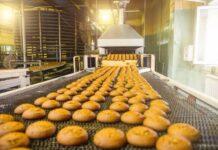Tetra Pak on 28 May unveiled its ‘Factory Sustainable Solutions’ offering, a new factory-wide approach to energy, water and cleaning-in-place (CIP) optimization.
A new offer within Tetra Pak’s broader sustainability portfolio, the ‘Factory Sustainable Solutions’ business offers food and beverage (F&B) producers a tailored blend of state-of-the-art technologies and leading plant integration capabilities. It seeks to support F&B producers in optimizing energy and resource consumption, an important step in helping customers meet their sustainability ambitions and reduce operational costs.
Traditionally reliant on fossil fuels and energy-intensive processes, F&B producers are under increasing pressure to optimize resources and increase energy generation from renewable sources. This comes amidst rising operational expenses, including the cost of raw materials, as well as new CO2 taxes and fees for wasted water. Finding solutions to these challenges will be key, with businesses looking to their supply chains and manufacturing processes to help achieve cost savings.
Complementing its resource-efficient equipment and services portfolio, Tetra Pak’s ‘Factory Sustainable Solutions’ embodies a systematic, factory-wide approach. Solutions can be integrated at any stage to recover and reduce the consumption of resources, such as energy, water and chemicals. Optimised resource consumption reduces long-term operational costs and related greenhouse gas emissions, whilst supporting compliance against ever-tightening sustainability standards.
The Tetra Pak Factory Sustainable Solutions team will support customers by finding the right technologies and integration solutions for their needs, advising them on the best practice set-up for their line or facility. This results in a tailored pipes and installation diagram that optimises water, energy and CIP according to the specific needs of the customer’s operations.
The ‘Factory Sustainable Solutions’ offering boasts state-of-the-art technologies, such as:
Nanofiltration, which reclaims caustic cleaning liquid used for CIP. This solution, developed by Tetra Pak, allows for the recovery of clean chemicals and water for future re-use, enabling up to 90% recovery of the total spent liquid.
Reverse Osmosis, uses proprietary membrane filtration technology developed by Tetra Pak to improve resource efficiency across multiple applications, including milk separation and water re-use.
Tetra Pak is also collaborating with innovative technology partners to offer additional solutions, including:
HighLift heat pump technology, in collaboration with Olvondo Technology, which can be integrated into operations to facilitate the reuse of waste heat to produce steam across plant equipment, including the Tetra Pak Direct UHT unit, at pressures up to 10 bar.
High temperature heat pumps, in collaboration with Johnson Controls, which up-cycles process waste heat to use elsewhere in the factory.
Solar thermal collectors, in collaboration with Absolicon, which utilise the sun as an unlimited source of clean and renewable energy, to power the delivery of hot water and steam – at temperatures above 150°C – making it suitable for UHT applications.
Stefano Vittor, CEO at Olvondo Technology, says, “By incorporating our HighLift heat pump technology into its Factory Sustainable Solutions business, Tetra Pak is offering an impactful solution to reduce carbon emissions across the food and beverage industry. We’re delighted to be part of this collaboration and to play a role in the change that Tetra Pak is driving.”
Fredrik Norrbom, director, Sweden at Johnson Controls System and Service AB added,“Approximately two-thirds of industrial energy use is driven by heat demand, derived largely from fossil fuels6. Heat pumps are vital for increasing energy efficiency and delivering net zero heating when combined with renewable electricity. We are proud to collaborate with Tetra Pak on smart building solutions that can help customers achieve sustainability targets while also helping industry make critical progress on emissions reduction.”
Nicole Uvenbeck, director, Factory Sustainable Solutions and OEM Components at Tetra Pak says, “This launch is an incredibly exciting and significant milestone for us at Tetra Pak – especially our team who have been working hard to push the boundaries of the impact and value such an approach can bring for our customers.
To date, we have mainly focused on machine and line optimisation, and we came to realise the overwhelming benefit of replicating this at a factory level, providing a more holistic approach to optimisation. Factory Sustainable Solutions is an evolution of our expertise, spanning water, energy and CIP recovery. All of this combined will redefine how we support our customers in achieving their sustainability ambitions, while reducing their operational costs.”
Fiona Liebehenz, vice president, Key Components, Plant Solutions and Channel Management at Tetra Pak says: “I’m extremely proud of the team. We know that our customers are under pressure more than ever to operate as efficiently as possible when it comes to resource usage. This is, for many, an existential challenge to secure the future of their operations. Through working with them and understanding their individual needs and objectives, we’re providing them fit-for-purpose equipment enriched with our holistic food & beverages application knowledge to address that challenge, delivering tangible improvements in a way that is financially advantageous.”
The business with Tetra Pak’s Factory Sustainable Solutions expertise and advisory are available globally.
IndiFoodBev — authentic, impactful and influential
An English-language food and beverage processing and packaging industry B2B platform in print and web, IndiFoodBev is in its third year of publication. It is said that the Indian food and beverage industries represent approximately US$ 900 billion in revenues which implies more than 20% of the country’s GDP. Eliminating the wastage on the farmside can help to deliver more protein to a higher number of the population apart from generating sizable exports. The savings in soil, seeds, water, fertilizer, energy and ultimately food and nutrition could be the most immense contribution that country is poised to make to the moderation of climate change.
To improve your marketing and grow sales to the food and beverage processing and packaging industry, talk to us. Our research and consulting company IppStar [www.ippstar.org] can assess your potential and addressable markets in light of the competition. We can discuss marketing, communication, and sales strategies for market entry and growth.
Suppliers and service providers with a strategy and budget for targeted marketing can discuss using our hybrid print, web, video, and social media channels to create brand recognition linked to market relevance. Our technical writers are ready to meet you and your customers for content.
The second largest producer of fruit and vegetables in the world is continuously expanding processing capacities and delivery systems with appropriate innovative technologies. We cover product and consumer trends, nutrition, processing, research, equipment and packaging from farm to thali. Get our 2025 media kit and recalibrate your role in this dynamic market. Enhance your visibility and relevance to existing markets and turn potential customers into conversations. Ask for a sample copy of our bi-monthly in print or our weekly IndiFoodBev eZine each Wednesday.
For editorial info@ippgroup.in — for advertisement ads1@ippgroup.in and for subscriptions subscription@ippgroup.in
Naresh Khanna – 10 February 2025
Subscribe Now











